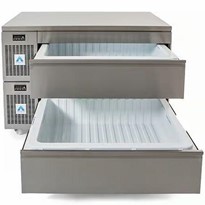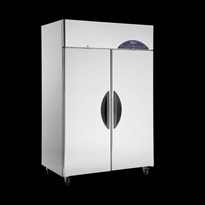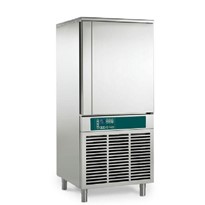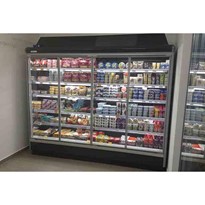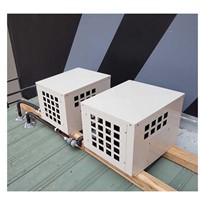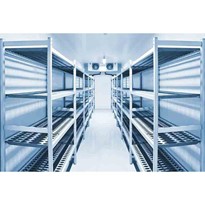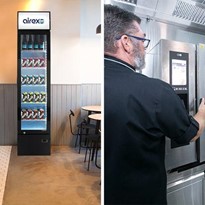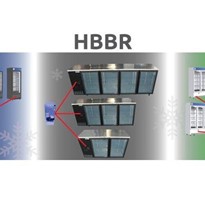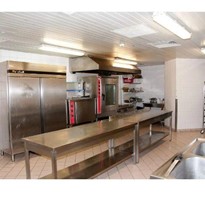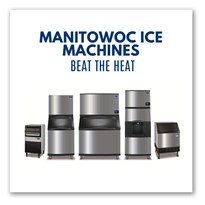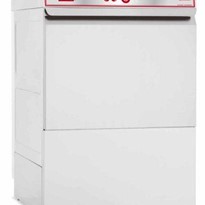Knowing how to maintain and clean commercial refrigeration units is not just a choice; it's a necessity for any establishment dealing with perishable goods.
Regular maintenance and proper cleaning of these refrigeration units are paramount, ensuring that your inventory stays fresh and your customers remain safe. In this blog, we will explore the indispensable techniques and expert tips required to uphold the integrity of your commercial refrigeration equipment.
From understanding the intricate components of these units to implementing eco-friendly cleaning solutions, we will cover it all. So, whether you are a seasoned restaurateur or a budding entrepreneur venturing into the food industry, this guide will equip you with the knowledge needed to guarantee the optimal performance of your commercial refrigeration units.
Table Of Contents:
-
How to Maintain and Clean Commercial Refrigeration Units
-
Understanding the Importance of Commercial Refrigeration Maintenance
-
Maintenance Means More Than Just Cleaning
-
A Well-Maintained Fridge Saves You Money.
-
Essential Components of Commercial Refrigeration Units
-
Role and Maintenance of Evaporator Coils
-
Importance of Condenser Coils in Refrigeration Units
-
Air Filters in Commercial Refrigerators
-
Step-by-step Cleaning Process:
-
Drain Pans and Tubes Maintenance
-
The Process: How To Clean Drain Pans
-
Tubes: What You Need To Know
-
Maintenance Frequency And Importance
-
Door Gaskets Inspection and Replacement
-
Cleaning Door Gaskets: A How-To Guide
-
Making The Call To Replace Your Door Gasket
-
Best Practices for Cleaning Stainless Steel Surfaces
-
The Cleaning Process
-
Maintaining Shine & Preventing Damage
-
Regular Cleaning Is Key
-
Tips for Maintaining Other Components of Commercial Refrigeration Units
-
Cleaning Tubing Regularly
-
Maintain Your Split Doors For Optimal Sealing
-
Clean Spills Immediately To Prevent Damage
-
Frequently Asked Questions:
-
What is the best way to maintain refrigeration units?
-
How do you clean and organise a commercial refrigerator?
-
What do you clean a commercial refrigerator with?
-
How often should a commercial refrigerator be cleaned?
-
Conclusion
Understanding the Importance of Commercial Refrigeration Maintenance
Consider your commercial refrigeration units as high-performance sports cars. Just as a Ferrari requires regular maintenance to stay in top condition, your commercial fridge needs the same care. Neglecting its upkeep can be detrimental.
Routine maintenance and proper cleaning are essential for ensuring longevity and optimal functionality. By implementing regular maintenance, you can extend the life expectancy of your refrigeration equipment by up to 40%. This not only saves you money on repairs and replacements in the long run but also conserves your business's time and resources.
In addition to prolonging the lifespan of your fridges, well-maintained units perform better. They effectively keep food at safe temperatures and operate with greater efficiency compared to neglected ones. This translates to lower energy bills and reduces the risk of unexpected breakdowns that could lead to costly repairs or, worse, food spoilage.
Maintenance Means More Than Just Cleaning
Cleaning is certainly important - particularly removing build-up debris from evaporator coils that could restrict airflow or cause component failure - but maintaining your unit goes beyond this task alone.
You've got other parts such as condenser coils needing attention too; these require warm air to pass through them regularly clean so they don’t become clogged with dust particles which can reduce their cooling effectiveness over time.
A Well-Maintained Fridge Saves You Money.
This might surprise some people out there but yes, taking good care of your commercial refrigerator can save money long-term because when everything runs smoothly inside these machines – they use less electricity compared to poorly maintained models suffering frequent stop-start cycles due to blocked vents or malfunctioning parts.
And if that’s not convincing enough, let's throw in another benefit of regular maintenance: It keeps your equipment running at peak efficiency which can prevent premature wear and tear leading to potential component failure. The last thing you need is an out-of-order sign on your fridge during a busy service.
Key Takeaway:
Commercial refrigeration unites can be a real game-changer for your business. It's not just about cleaning; parts like condenser coils need regular check-ups too.
Treat your fridge like you would a sports car, and it'll serve you well in return with fewer breakdowns, reduced energy bills, and no wasted food due to spoilage. Don't forget - good maintenance could extend its lifespan by up to 40%. So give your commercial fridges the attention they deserve.
Essential Components of Commercial Refrigeration Units
The lifeblood of any commercial kitchen, a refrigeration unit consists of key components like evaporator coils, condenser coils, air filters, drain pans, and door gaskets. Each plays a unique role in keeping your fridge running smoothly.
Role and Maintenance of Evaporator Coils
In the world of commercial refrigerators, the evaporator coil is quite the star. It absorbs heat from inside the unit to keep things cool. But its stellar performance depends on regular cleaning.
You don't need an elaborate setup for this task. Warm water or detergent-based solutions work just fine to clean these crucial elements effectively. Regular cleaning of interior parts helps maintain efficiency while preventing food spoilage - a vital aspect for any business handling perishables.
Importance of Condenser Coils in Refrigeration Units
Moving onto another big player – the condenser coil. This component dissipates warm air that's been absorbed by your refrigerator’s evaporating coil into ambient room temperature so it doesn’t affect internal cooling.
To make sure they’re doing their job right you should be giving them a good clean regularly too with appropriate detergents or even simple warm water rinses can do wonders here as well.
Note: This guide might sound basic but let me tell you—overlooking these small maintenance tasks could lead to larger problems down the line. A bit daunting? Yes...but also completely manageable once you get started.
Key Takeaway:
Commercial refrigeration units rely on key components like evaporator and condenser coils. To keep your fridge running smoothly, clean these parts regularly with warm water or detergent-based solutions. This not only maintains efficiency but prevents food spoilage too. Remember, small maintenance tasks now can save big problems later.
Air Filters in Commercial Refrigerators
Air filters have an essential role: they absorb heat and let cool air circulate throughout the unit. Over time, dust and grime accumulate on these filters leading to reduced efficiency.
Freezer/Refrigerator Cleaner, specifically designed for commercial refrigeration equipment running at high capacity, is an excellent solution here. The cleaning process starts with turning off your refrigerator followed by carefully removing the dirty filter.
Step-by-step Cleaning Process:
-
Firstly, using a soft brush or vacuum cleaner attachment, remove loose dirt particles from the surface of the filter.
-
Secondly, soak it in warm water mixed with our recommended cleaner; this will loosen stubborn grease deposits making them easier to wipe away later.
-
Last but not least, after soaking, rinse thoroughly under clean water until no detergent residue remains, then allow it to dry fully before reinserting it into its slot inside your fridge.
If stains persist even after washing, it's recommended to replace the item rather than risking inefficient cooling. Inefficient cooling can lead to higher electricity bills and increase the chances of component failure due to improper ventilation. This can result in spoilage of stored items, causing unnecessary losses - something we all want to avoid.
Drain Pans and Tubes Maintenance
Let's delve into the nitty-gritty of keeping your commercial refrigeration unit running smoothly by focusing on drain pans and tubes. Regular cleaning is vital to prevent nasty build-ups that could lead to potential freezing, causing a complete halt in operations.
The Process: How To Clean Drain Pans
To start, eliminate excess grease from the pan by using warm water along with a detergent-based solution. This method effectively dislodges any stubborn grime that may be clinging onto stainless steel surfaces.
In addition to regular cleaning, it is important to be mindful of spills. If left unattended, they can quickly become breeding grounds for bacteria, which is something we definitely want to avoid.
Tubes: What You Need To Know
Cleaning tubes isn't as tricky as it sounds. All you need is warm water again along with some elbow grease (the hard work kind). This simple yet effective method aids in preventing build-up inside these often-overlooked components.
To make sure your efforts aren't wasted, carry out regular inspections. A quick visual check will help identify if there are any signs of blockage or damage that may require professional attention.
Maintenance Frequency And Importance
A consistent maintenance schedule keeps problems at bay while ensuring longevity for your equipment. How often should you be carrying out maintenance? Well, manufacturers recommend carrying out a good clean every week; however, this might vary depending on usage levels.
-
Cleanliness: By maintaining cleanliness you avoid attracting pests - something nobody wants near their food.
-
Efficiency: A well-maintained system is a happy one. Regular maintenance helps keep your commercial refrigeration unit running smoothly and efficiently.
-
Savings: Lastly, keeping things clean can save you money in the long run by avoiding costly repairs or even worse, replacements due to neglect.
Key Takeaway:
Regularly Clean and Inspect: Keeping your commercial refrigeration unit's drain pans and tubes clean can stop nasty build-ups, prevent freezing, and keep operations running smoothly. Regular inspections help spot blockages or damage early.
Maintain for Efficiency & Savings: Keeping your system in top shape means it'll run more efficiently, and that saves you money.
Door Gaskets Inspection and Replacement
If you've ever experienced a promising idea going awry due to a commercial fridge that just won't seal shut, the culprit may very well be the door gaskets. These rubber seals play a vital role in maintaining the cool air inside while keeping the warm air out.
To ensure their effectiveness, it's crucial to regularly inspect them. Over time, they can become brittle or torn, compromising their efficiency. If you're unsure about their condition, seeking specialist advice is highly recommended.
Don't underestimate the importance of checking these critical components of your refrigeration units for wear or damage every three months. It's not just a good idea—it's essential for optimal performance.
Cleaning Door Gaskets: A How-To Guide
You don’t need specialised equipment to clean door gaskets—just warm water and mild detergent will do the trick. Scrub gently using a soft cloth or sponge; avoid abrasive scrubbers as they could cause unnecessary harm.
A thorough cleaning at least once per week keeps grime from building up over time which helps maintain optimal sealing performance for longer periods between replacements – that means less food spoilage due to improper temperature control.
Making The Call To Replace Your Door Gasket
Occasionally, despite diligent maintenance, replacement becomes necessary when signs of wear are too significant. Cracks or gaps in the seal serve as tell-tale indicators that it may be time to consider new gaskets.
Keep in mind that an inefficient refrigerator can result in higher energy costs, surpassing the expenses of replacing worn-out parts. There are various products available for cleaning stainless steel surfaces, including the door gaskets of your commercial fridge.
By properly caring for and maintaining the door gaskets, you can ensure their longevity and optimal performance.
Key Takeaway:
Inspect, Clean and Replace Door Gaskets: It's crucial to keep your commercial fridge running efficiently. Regularly check the door gaskets for any signs of wear or damage. Cleaning them weekly with warm water and a mild detergent can prevent grime build-up. If you notice substantial wear such as cracks or gaps in the seal, don't hold back from replacing them - it'll be a wise move that saves money.
Best Practices for Cleaning Stainless Steel Surfaces
Stainless steel is a common material in commercial refrigeration units. Its shiny appearance and resistance to corrosion make it ideal for food service applications, but it needs regular cleaning to keep it looking its best.
Cleaning stainless steel isn't complicated; you just need the right tools and techniques. One essential item is an effective stainless steel cleaner and polish solution. This product helps remove dirt, grease, and fingerprints while also protecting the surface from future stains.
The Cleaning Process
To start with your cleaning routine, warm water mixed with a mild detergent does wonders. It's soft on surfaces yet powerful enough to cut through grime without causing any damage or scratches.
You should always apply the soapy mixture using a non-abrasive cloth or sponge because abrasive scrubbers can scratch the finish of stainless-steel surfaces which will not be a pretty sight.
Rinse thoroughly after washing then dry completely using another clean towel - this prevents water spots from forming due to mineral deposits in water that can dull down our lovely shiny finish over time.
Maintaining Shine & Preventing Damage
In addition to regular cleaning, regularly polishing stainless steel can add a delightful shine and provide extra protection against rust. If you prefer eco-friendly options, a thin layer of olive oil applied with a gentle cloth can serve as a natural polisher.
However, commercially available cleaners and polish solutions are often more effective in delivering long-lasting shine, especially those specifically formulated for this purpose. Remember to always polish in the direction of the grain – this crucial step prevents unsightly streaks and helps conceal any minor scratches that may be present.
Regular Cleaning Is Key
The key stat here is regularity - scrubbing the internal and external parts of your commercial refrigeration unit regularly (at least once a week) not only maintains cleanliness but also helps prevent damage. So make sure you've got these best practices for cleaning stainless steel surfaces nailed down.
Keeping your fridge in top shape isn't just about cleanliness, it's also crucial for the longevity of the appliance and ensuring food safety.
Key Takeaway:
Regular upkeep is key to keeping your commercial refrigerator in top-notch condition. By giving it a little TLC now and then, you're not just preserving its shine; you're ensuring smooth operation for years to come.
Tips for Maintaining Other Components of Commercial Refrigeration Units
Maintaining commercial refrigeration units isn't just about the coils and filters. There are other parts too that need regular attention to keep your refrigerator running smoothly.
One such component is the tubing, which should be cleaned regularly to avoid any build-up debris that can hamper performance. The same goes for split doors - a good clean ensures proper sealing and prevents cool air from escaping, thereby avoiding higher temperatures inside the unit.
When it comes to cleaning these components, you'll want to use warm water and a detergent-based solution. This helps in removing dirt without causing damage. But remember. Avoid abrasive scrubbers as they could lead to unnecessary wear and tear on your equipment.
Cleaning Tubing Regularly
The tubing of your refrigeration unit acts as an important conduit between different sections of the machine. So when it gets clogged up with dust or grime, it may cause component failure due to pressure buildup.
You might ask why this happens. Well, when warm air passes through cold tubes during normal operation, there's moisture buildup which attracts dirt particles leading eventually towards blockage if not addressed timely.
Maintain Your Split Doors For Optimal Sealing
Your fridge’s split door plays an essential role in keeping food at safe storage temperatures by preventing leakage of cool air. Manufacturers recommend inspecting them periodically for signs of damage or wear – ensuring they're always providing optimal sealing will help prevent food spoilage.
Clean Spills Immediately To Prevent Damage
Food spills and drips are inevitable in any commercial kitchen. If left unchecked, these spills can lead to corrosion and other serious issues due to the sticky residue they create. It is important to promptly clean up these spills using an appropriate cleaning solution.
By following these maintenance tips, not only will you keep your equipment in top shape, but you will also significantly extend its lifespan.
Key Takeaway:
Keeping commercial refrigeration units in top condition is about more than just coils and filters. Regularly cleaning tubing prevents debris build-up that can hamper performance, while ensuring split doors are well-maintained helps avoid cool air escaping.
Don't forget to clean spills promptly with a suitable solution - this not only keeps your unit looking good but also extends its lifespan by preventing potential damage caused by corrosion or other spill-related issues.



